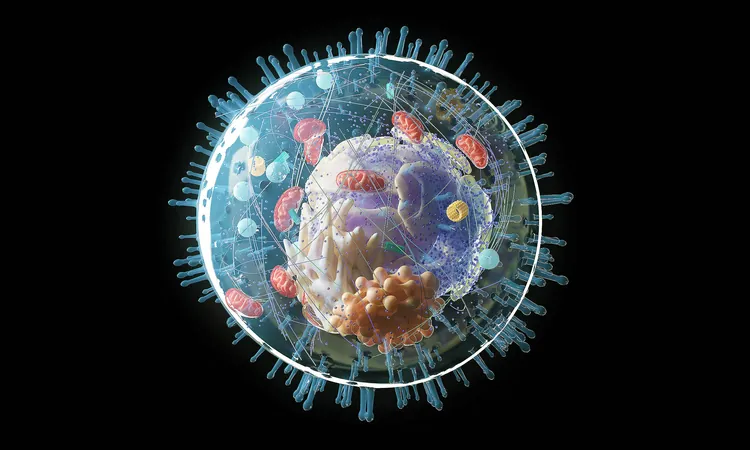
Revolutionary Research Reveals Memory Is More Than Just a Brain Function!
2024-11-17
Author: Ying
For decades, we have been led to believe that memory and learning are solely the domains of the brain. Our understanding primarily revolves around the idea that the brain, with its intricate network of neurons, houses our memories. However, groundbreaking research from a team at New York University flips this narrative on its head, suggesting that our body’s other cells may also play a significant role in memory retention.
This shift in perspective is nothing short of revolutionary. The new study uncovers that not only brain cells but also non-brain cells can participate in the learning process, providing a fresh lens through which we can understand memory. This discovery could lead to transformative treatments for learning disabilities and memory disorders, opening up an exciting new field of study in neuroscience.
What Is Memory, Exactly?
Memory operates like a sophisticated filing system within our brain. When we encounter new information—whether it is a face, a place, or a concept—our brains encode these experiences as unique patterns of neural activity. These patterns are stored in different regions depending on the type of information—visual memories might occupy areas dedicated to processing visual inputs, while language-related data finds its home in regions responsible for linguistic comprehension.
When it’s time to retrieve a memory, your brain acts like a search engine, activating the relevant pathways to bring that information back into your conscious thought. This process can vary in clarity; sometimes, memories may feel vague or muddled, particularly if they haven’t been revisited frequently.
The Role of Non-Brain Cells in Memory Formation
Lead researcher Nikolay V. Kukushkin emphasizes the novelty of this discovery. “Learning and memory are often attributed to the brain and its cells, but our study reveals that other body cells, too, have the capacity to learn and retain memories.”
The research investigated non-brain cells by utilizing a well-known neurological principle called the massed-space effect, which suggests that our memory retention is significantly enhanced when information is absorbed over spaced intervals rather than concentrated into a single study session—a phenomenon familiar to anyone who’s crammed for an exam only to forget the material shortly after.
In the lab, the researchers examined two different types of human cells—one from nerve tissue and another from kidney tissue. These cells were subjected to various patterns of chemical signals similar to the neurotransmitter patterns that brain cells experience during learning.
Findings: Non-Brain Cells Also “Remember”!
To their astonishment, these non-brain cells activated a specific "memory gene" in response to the chemical cues. This gene is typically associated with memory formation in brain cells. The researchers ingeniously designed these cells to produce a glowing protein that indicated whether this gene was active or not.
When subjected to repeated chemical pulses, akin to bursts of neurotransmitters in the brain, these cells not only recognized patterns but showed a remarkable ability to engage this memory gene more intensely and for a longer duration as compared to when the same stimulation occurred in continuous spurts. This proved that the phenomenon of spaced repetition is not limited to brain cells but could be a universal characteristic of all cells.
Implications: A Paradigm Shift in Understanding Memory
Kukushkin believes that these findings could lead to drastically new ways of enhancing learning and developing treatments for various memory-related issues. “This research paves the way for a deeper understanding of memory formation and suggests that the body's other functions, like metabolism or cellular responses to treat diseases, might also involve a memory-like mechanism.”
The potential implications are vast: Could cells in our pancreas recall patterns of sugar intake to regulate glucose levels better? How might cancer cells "remember" chemotherapy treatment patterns to develop resistance?
Conclusion: The Future of Memory Research
As we delve deeper into the implications of this research, the questions are abundant. This innovative study not only challenges our current understanding of memory but also signals a future where treatment strategies for learning and memory impairments could be reshaped.
The published research in *Nature Communications*, which includes contributions from notable experts like Thomas Carew, is just the tip of the iceberg. As scientists continue to unpack this fascinating discovery, the landscape of neuroscience and our understanding of the bodily memory could be transformed forever.
Stay tuned for more updates on this mesmerizing intersection of biology and memory!



 Brasil (PT)
Brasil (PT)
 Canada (EN)
Canada (EN)
 Chile (ES)
Chile (ES)
 España (ES)
España (ES)
 France (FR)
France (FR)
 Hong Kong (EN)
Hong Kong (EN)
 Italia (IT)
Italia (IT)
 日本 (JA)
日本 (JA)
 Magyarország (HU)
Magyarország (HU)
 Norge (NO)
Norge (NO)
 Polska (PL)
Polska (PL)
 Schweiz (DE)
Schweiz (DE)
 Singapore (EN)
Singapore (EN)
 Sverige (SV)
Sverige (SV)
 Suomi (FI)
Suomi (FI)
 Türkiye (TR)
Türkiye (TR)